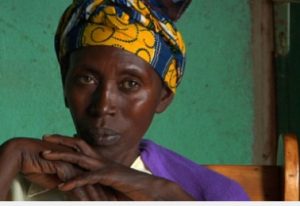. . WOMEN’S EQUALITY . .
An article from the Coalition for the International Criminal Court
19 June marks the International Day for the Elimination of Sexual Violence in Conflict. It is the second time this International Day is celebrated, and this year’s theme “Preventing Sexual Violence Crimes through Justice and Deterrence” commemorates the advances that have been made through international justice, not in the least through the work of the International Criminal Court (ICC), to eradicate these heinous crimes.

The documentary “The Uncondemned” profiles the Rwandan women, lawyers and activists who helped bring about the first prosecution of rape as a war crime © The Uncondemned
SGBV: A conflict strategy
Conflict-related sexual and gender-based violence (SGBV) is a widespread weapon of war—seen in conflicts in the Central African Republic, the Democratic Republic of Congo, Mali, Darfur and Syria, to name but a few. It is used to terrorize, to degrade, to punish communities and to ethnically “cleanse.” Women and girls are predominantly the victims; but men and boys are also targeted and suffer. Survivors are often marginalized and stigmatized, with little hope of seeing their attackers brought to justice.
“Sexual violence is a threat to every individual’s right to a life of dignity, and to humanity’s collective peace and security. … Let us therefore use this day to rededicate ourselves, on behalf of every survivor, to ending sexual violence in conflict and providing peace and justice for all.” — UN Secretary-General, António Guterres
The Rome Statute: Prosecuting the perpetrators
Encouragingly, the past four years have seen much more visibility for SGBV on the international justice, peace and security agendas since the UN Security Council unanimously adopted Resolution 2106 in June 2013, which recognizes the centrality of ending impunity for the prevention of SGBV in conflict and encourages states to strengthen accountability at the national level.
Adopted in 1998, the Rome Statute was one of the first international treaties to extensively address conflict-related SGBV as crimes against humanity, war crimes and, in some instances, genocide. From the beginning of her term in office, ICC Prosecutor Fatou Bensouda has been proactive in addressing the gender-justice gap and made the investigation and prosecution of sexual and gender-based crimes a priority as witnessed by her Policy Paper on Sexual and Gender-Based Crimes, the first ever such document for an international court or tribunal.
(article continued in right column)
Protecting women and girls against violence, Is progress being made?
(article continued from left column)
“The message to perpetrators and would-be perpetrators must be clear: sexual violence and gender-based crimes in conflict will neither be tolerated nor ignored at the ICC. We will spare no effort to bring accountability for these crimes and in so doing, contribute to deterring the commission of such heinous crimes in the future. As a matter of policy, the Office will systematically include relevant charges in its cases on the basis of evidence of criminality.” – ICC Prosecutor Fatou Bensouda
The Rome Statute also contributes to accountability and redress for SGBV through its catalytic effect at the national level. This means that if a state ratifies the Statute and incorporates its far-reaching SGBV provisions into domestic legislation, these crimes can be prosecuted by national courts. By supporting the universality of the Rome Statute and the incorporation of Rome Statute crimes into domestic law, states and civil society can help ensure that the perpetrators of such crimes are held accountable. Many have argued the potential for such a shift in domestic legal culture to promote gender equality more broadly by strengthening women’s rights and increasing their access to justice.
The ICC: Inclusive gender justice
Another example of the Court’s catalytic effect is the vastly under-reported and misunderstood SGBV against men and boys in conflict. It is very difficult to even just talk about SGBV related issues in any culture, an issue that is exacerbated when such violence targets men and boys. The ICC’s Rome Statute, which is explicitly gender-neutral in its description of what constitutes sexual violence, is seen by many as a potential leader is bringing this conversation home to the domestic level.
While there are encouraging signs that conflict-related SGBV is finally getting the attention it so badly deserves, civil society will continue its efforts to ensure the eradication of sexual violence in conflict remains at the top of the international agenda. Commitments made at the UN and elsewhere need to turn into action and accountability. States need to provide greater support to stakeholders in addressing the root causes of gendered violence, strengthen efforts for redress for victim-survivors and ensure that women and gender perspectives are always part of prevention and peace processes.
And the ICC is doing its part. The Court handed down its first conviction for rape as a war crime and as a crime against humanity in March 2016 – against former Congolese rebel militia leader Jean-Pierre Bemba. By developing international jurisprudence on SGBV, the ICC is showing that sexual violence can no longer be treated as a collateral crime; helping destigmatize victims; and working to deter the future commission of such heinous acts.
(Thank you to Janet Hudgins, the CPNN reporter for this article.)